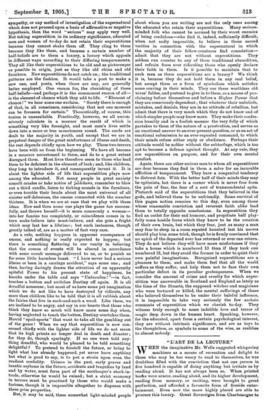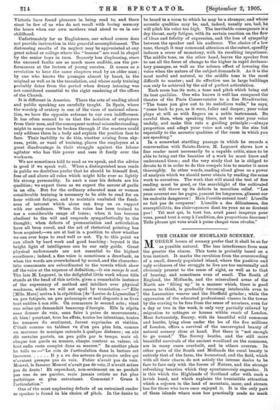" L'ART DE LA LECTURE."
WHEN the imaginative Mr. Wells suggested whispering machines as a means of recreation and delight to those who may be too weary to read to themselves, he was doubtless filled with the conviction that not one person in five hundred is capable of doing anything but irritate us by reading aloud. It has not always been so. When printed books were scarce, reading aloud, and its higher development, reading from memory, or reciting, were brought to great perfection, and afforded a favourite form of fireside enter- tainment. Even now, the more highly placed are able to procure this luxury. Great Sovereigns from Charlemagne to
Victoria have found pleasure in being read to, and there raust be few of us who do not recall with loving memory the hours when our own mothers read aloud to us in our childhood.
Unfortunately for us Englishmen, our school course does not provide instruction in this graceful accomplishment. The distressing results of its neglect may be appreciated at any great school or college where the "lessons" are read in chapel by the senior boys in turn. Scarcely less displeasing, since the uncured faults are so much more audible, are the per- formances at the lectern of young curates. It comes as a revelation to hear the same chapters read by an older man ; by one who knows the passages almost by heart, in the original as well as in the translation, and whose early training probably dates from the period when dreary intoning was not considered essential to the right rendering of the offices of the Church.
It is different in America. There the arts of reading aloud and public speaking are carefully taught. In Spain, where the worship of oratory is one of the vices of national educa- tion, we have the opposite extreme to our own indifference. It has often seemed to us that the isolation of employers from their men, and the consequent mutual misunderstanding, might in many cases be broken through if the masters could only address them in a body and explain the position face to face. Their inability to do this, whether arising from shy- ness, pride, or want of training, places the employers at a great disadvantage in their struggle against the labour agitator who has this power and uses it freely over the workmen.
We are sometimes told to read as we speak, and the advice is good if we speak well. When a distinguished man reads in public we doubtless prefer that be should be himself first, free of and above all rules which might hide ever so lightly his strong personality. In such a case his defects are his qualities; we expect them as we expect the savour of garlic In an olla. But for the ordinary educated man or woman considerable training is necessary to be able to read for an hour without fatigue, and to maintain unabated the fresh- ness of interest which alone can keep us en rapport with our audience. When the voice has been trained to use a considerable range of tones ; when it has become Obedient to the will and responds sympathetically to the thought ; when defects of pronunciation and articulation have all been cured, and the art of rhetorical pointing has been acquired,—we are at last in a position to show whether we can ever hope to read well or not. Up to this point we can climb by 'hard work and good teaching : beyond it the bright light of intelligence can be our only guide. Great physical endowments are not essential to the highest excellence ; indeed, a fine voice is sometimes a drawback, as when the words are overwhelmed by sound, and the character- istic consonants are subordinated to the vowels which show Off the voice at the expense of definition,—le eon mange is mot. The late M. Legonve, in the delightful little work whose title stands at the head of this article, gives a remarkable instance of the supremacy of method and intellect over physical weakness, which we will not spoil by translation :—" Elle [Mlle. Mars] arriva a la repetition [de 'Louise de Lignerolles1 un peu fatiguee, un pen preocenpee et mai disposee h se livre tout entiere h son role. On commence le second acte ; vient tine scene qui demandait beaucoup d'energie. Elle la repeta sans donner de voix, sans faire h peine de mouvements ; eh hien! pourtant, tons les effete, tentes les intentions, toutes les nuances du sentiment, fnrent exprimees et visibles. C'etait comme un tableau vu d'un pen plus loin, comme un morceau de musique entendu 1 quelque distance ; on ea dit certains pastels, un peu palls par le temps, mais alt chaque ton garde sa nuance, chaque contour sa valour, oh tout enfin rests complet dans sa mesure." In another place he tells us :—" Le role de rarticulation dans la lecture eat
Immense fl y a en des acteurs de premier ordre qui n'avaient presque pas de you'. Potier n'avait pm de voix. Monvel, le fameux Monvel n'avait pm de voix, ii n'avait meme pas de dents ! Et cependant, non-senlement on ne perdait pas tine de sea paroles, mais jamais artiste ne fnt plus pathetique et plus entrainant. Comment ? Grace h rarticulation."
One of the most unpleasing defects of an untrained reader br speaker is found in his choice of pitch. In the desire to be heard in a room to which he may be a stranger, and whose acoustic qualities may .be, and, indeed, usually are, bad, he will pitch his voice too high. The inaitable consequence it dry throat, early fatigue, with its certain reaction on the flow of ideas and felicity of expression, and the loss of sympathy between the speaker and his audience. The choice of a low tone, though it may command attention at the outset, speedily' induces a sense of monotony, with its resulting impatience. The middle tone, on the other hand, leaves the speaker free to use all the force of change to the higher in rapid declama- tory passages, as well as the solemn effect of lowering the voice when the nature of the subject demands it. As it is the most useful and natural, so the middle tone is the most difficult to master ; and its effective use in large buildings can only be achieved by the aid of perfect articulation.
Each room has its note, a tone and pitch which bring out its best qualities. One who knows it well has compared the theatre of the Paris Conservatoire to a fine Stradivarius: "The tones you give out to its melodious walls," he says; "come back to you, as it were, fuller and deeper; your voice' plays at will as with fingers on a noble instrument. Be careful then, when speaking there, not to raise your voico unduly, and make this rule a guiding principle :—always proportion and adapt your voice not only to the size but especially to the acoustic qualities of the room in which you are speaking."
In a somewhat startling passage in which he records a conversation with Sainte-Beuve, M. Legonve shows how n fine reader must necessarily be a capable critic, since to be able to bring out the beauties of a work he must know and understand them ; and the very study that he is obliged ta devote to it in order to do this compels him to master it mere thoroughly. In other words, reading aloud gives us a power of analysis which we should never obtain by reading the same work to ourselves. The work that will stand the test of fine reading must be good, or the searchlight of the cultivated reader will throw up its defects in mercilets relief. "Lea yens courent sur les pages, passent les longueurs, glissent sur les endroits dangereux ! Male roreille entend tout! L'oreille ne fait pm de coupures ! L'oreille a des delicatesses, des susceptibilites, des clairvoyances flout les yeux ne-se dontent pas ! Tel mot qui, In tout bas, avait passé inapereu pour vons, prend tout a coup h l'audition, des proportions en.ormes I Telle phrase qui vons avait h peine choque vous revolte."



































 Previous page
Previous page